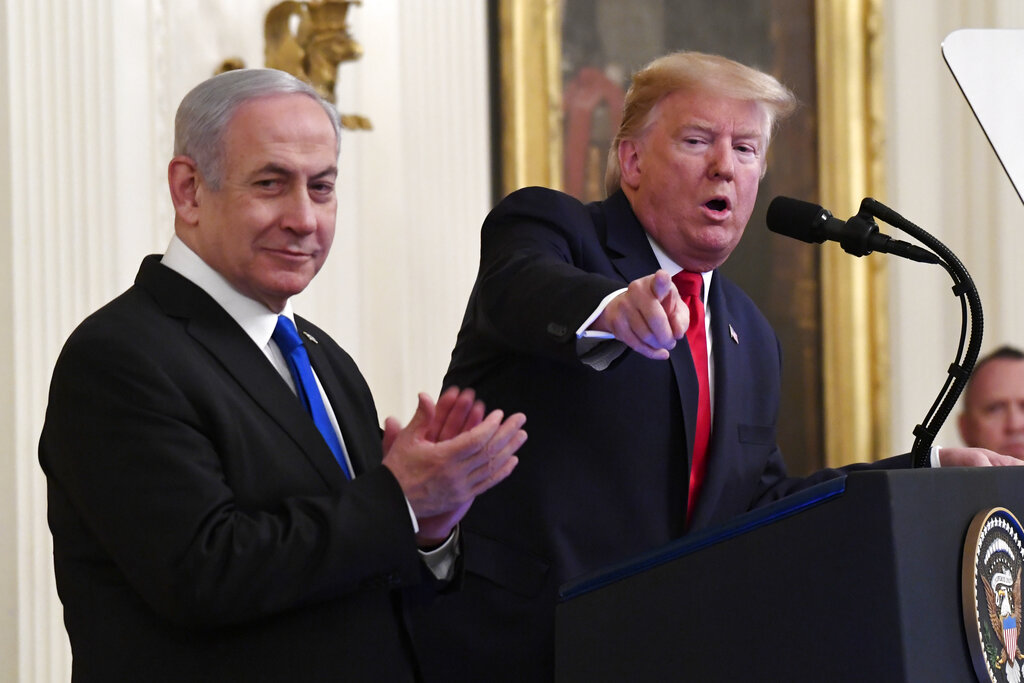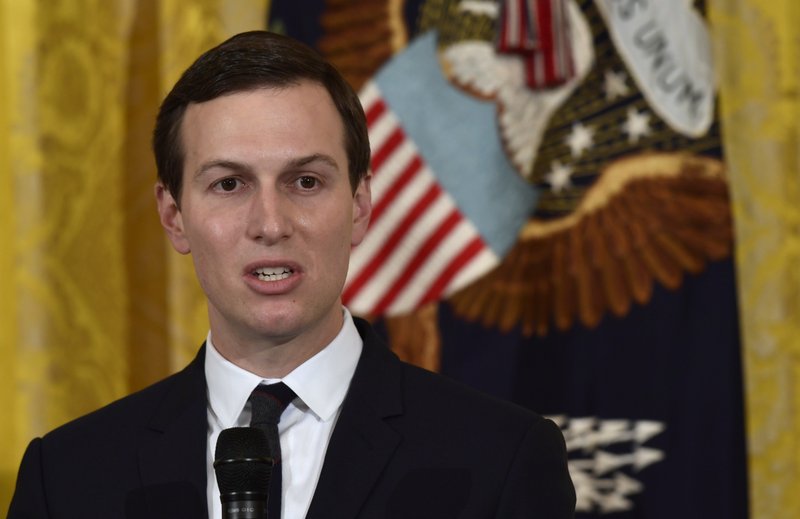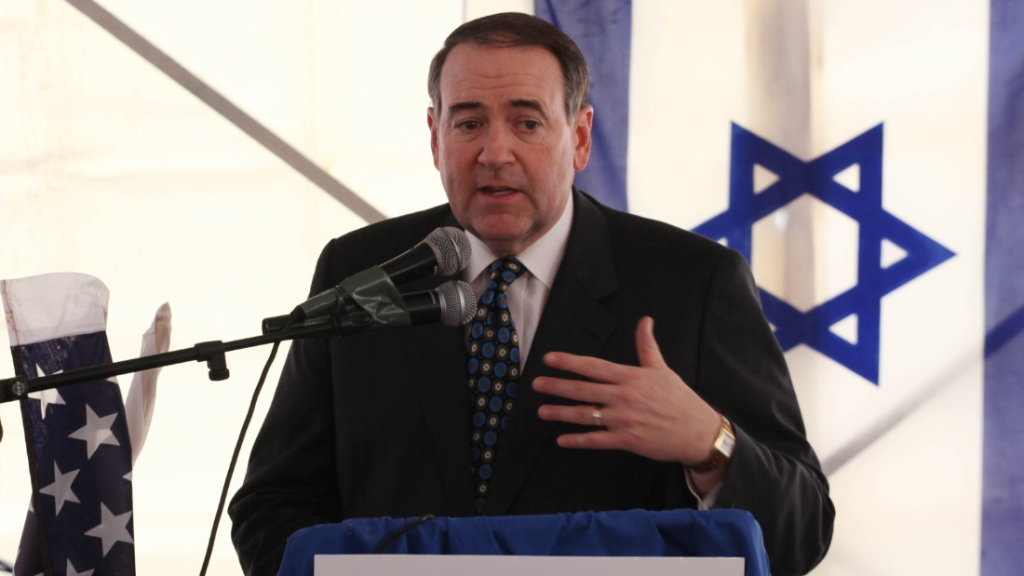Donald Trump peace plan delights Israelis, enrages Palestinians

Trump’s plan envisions a disjointed Palestinian state that turns over key parts of the West Bank to Israel.
White House pushes ahead with Mideast peace plan

The Trump administration is aiming to roll out its much-hyped but long-delayed Middle East peace plan next month amid signs it may further alienate the Palestinians by slashing millions of dollars in funding for humanitarian and development projects in the West Bank and Gaza. Five U.S. officials and a congressional aide say the administration intends to release the peace plan in mid- to late-June, shortly after the end of the Muslim holy month of Ramadan, although they cautioned that the timing could slip depending on developments in the region. They say the plan’s main authors — President Donald Trump’s son-in-law and senior adviser Jared Kushner and Trump’s special envoy for international negotiations Jason Greenblatt — have already begun quietly briefing select allies and partners on elements of the proposal. Yet any Palestinian willingness to even consider the plan would require conditions to improve and anger to subside considerably in the coming weeks, an unlikely scenario as the Palestinians say evidence of one-sided Trump giveaways to Israel continues to pile up. U.S. allies in Europe and the Persian Gulf also have felt compelled to criticize the administration for its approach. Ostensibly, Trump would need buy-in from those same countries to build enough momentum for any peace plan to succeed. The administration has been resisting congressional demands to fully close the Palestine Liberation Organization office in Washington because Greenblatt and Kushner want to keep that channel open in case the Palestinians are open to re-entering negotiations with Israel based on the plan. The office was ordered closed by former Secretary of State Rex Tillerson last November, but has been allowed to stay open for limited purposes under the administration’s interpretation of the law requiring it to be shut down in the absence of peace talks. The prospect of Palestinian interest in the peace proposal appears dim, however, particularly since Palestinian leader Mahmoud Abbas recalled the mission’s chief earlier this week to protest Monday’s opening of the new U.S. Embassy in Jerusalem. The embassy move is said to have contributed to violent protests in Gaza that were met with deadly force from Israel. Nearly 60 Palestinians were killed Monday by Israeli forces, drawing condemnations and calls for restraint from Europe and elsewhere. The U.S. declined to join those calls and, while regretting the loss of life, opposed efforts at the U.N. to open an international investigation into the violence. Trump’s recognition of Jerusalem as Israel’s capital, the embassy move and the administration’s unreserved defense of Israeli Prime Minister Benjamin Netanyahu’s policies have alienated and angered the Palestinian leadership, which accuses the administration of abandoning its role as a neutral arbiter in the conflict. Saeb Erekat, the chief Palestinian negotiator, said any deal needs to be between the Palestinians and Israel — not the United States. “I don’t need Jason Greenblatt. I don’t need Kushner,” Erekat said. “It’s our lives.” That sense of betrayal may deepen significantly this summer as millions of dollars in U.S. assistance to the Palestinians appears likely to be cut and the funds re-allocated to other regions. That money has been on hold since last year and existing funding for some projects will start to run out in just months if it is not approved in the next two weeks. If that does not happen, the State Department and the U.S. Agency for International Development will have to notify aid recipients that continued U.S. funding is not forthcoming and those programs will begin to be shut down. Local staffers would be laid off and U.S. officials running the projects would be reassigned elsewhere. Of $251 million in U.S. aid planned for the Palestinians in 2018, only $50.5 million has been reported spent, according to the government’s online tracker, www.foreignassistance.gov. The remaining more than $200 million is currently on hold, a figure that does not include an additional $65 million in frozen U.S. assistance to the U.N. Relief and Works Agency, which provides services to Palestinians in the West Bank, Gaza, Jordan and Lebanon. The U.S. aid pays for programs on education, health, good governance and democracy promotion as well as disaster preparedness and security. For several months the White House has been sitting on State Department and USAID recommendations to spend at least some of the money, according to the officials. Three officials said there is no indication those recommendations will be acted upon any time soon despite appeals from lawmakers and even expressions of concern from Israel, which sees value in the assistance especially in the security sector. One official said there was “an overwhelming lack of urgency” about making a decision on the funding. The other two said there was no sign that the end-of-May timeframe would be met. “The administration is currently reviewing U.S. assistance to the Palestinians,” USAID said in a statement to The Associated Press. “USAID is in discussions with all affected implementing partners on the status of the review, and is working closely with the interagency, as the administration concludes its review.” At immediate risk are between five and 10 of the some 20 USAID projects in the West Bank and Gaza, along with proposed new initiatives, the officials said. Without a quick decision those will run out of money by the end of 2018, they said. Nearly all of the others will run out of money in early 2019 unless the U.S. funding is unblocked, they said. Republished with the permission of the Associated Press.
Donald Trump calls Mideast peace ‘toughest deal’

Donald Trump says that if he’s elected president, he’ll know within six months whether he can achieve an elusive peace accord between Israelis and Palestinians, one of the world’s most vexing challenges. But the Republican presidential candidate says he has doubts about each side’s commitment to the peace process. “I have a real question as to whether or not both sides want to make it,” Trump said in an interview with The Associated Press. The Republican presidential front-runner said his concerns are greater regarding “one side in particular.” While Trump wouldn’t say whether he was referring to the Israelis or the Palestinians, he said the chances for a lasting peace rest with Israel. “A lot will have to do with Israel and whether or not Israel wants to make the deal — whether or not Israel’s willing to sacrifice certain things,” Trump said. “They may not be, and I understand that, and I’m OK with that. But then you’re just not going to have a deal.” “If I win, I’ll let you know six months from the time I take office,” he added. Trump was short on specifics about how he would tackle trying to broker peace in the Middle East, or even whether he supports the longstanding U.S. government goal of a two-state solution — saying he didn’t want to show any bias in favor of one side or the other in case he does become president. “Look, we show our cards too much in negotiations,” Trump said. Still, the billionaire businessman who has made his skills as a dealmaker a key piece of his pitch to voters was visibly enthusiastic about the prospect of tackling the intractable foreign policy challenge. “I think if I get elected, that would be something I’d really like to do,” Trump said during the interview at his golf club in northern Virginia. “Because so much death, so much turmoil, so much hatred — that would be to me a great achievement. As a single achievement, that would be a really great achievement.” Trump said a key to peace negotiations would be meeting early in his presidency with top leaders in the region. He said he planned to meet Israeli Prime Minister Benjamin Netanyahu during a trip to Israel “sometime after Christmas, probably.” “You know, I’m going to be probably going over there pretty soon and I want to see him, I want to see other people, I want to get some ideas on it,” he said. He added that the trip had been in the works long before rival Ben Carson’s recent trip to Jordan to visit Syrian refugees. Trump said he was a “big, big fan” of Israel. Yet his questioning of Israel’s commitment to a lasting peace with its Palestinian neighbors could still raise eyebrows in some Republican corners. Trump sat down and shared his views on Israel in an AP Conversation — a series of extended interviews with the 2016 candidates to become the nation’s 45th president. ___ During his unexpected five-month run atop the Republican field, Trump’s rivals for the GOP nomination have argued he lacks depth and fluency on foreign policy. At the heart of his campaign is Trump’s argument that his experience in business and real estate would prepare him for negotiations with world leaders. Trump took a similar approach in discussing Israeli-Palestinian peace, saying the only way to resolve the issue is “if you had a real dealmaker, somebody that knew what he or she is doing.” “I’ll be able to tell in one sit-down meeting with the real leaders,” he said. Trump evaded specific questions about whether Palestinian demands in peace negotiations are legitimate and whether Israel should be allowed to build settlements in the West Bank without restrictions, though he said the Israeli housing projects were a “huge sticking point” in talks. “I have my feelings on it, but I’m just not going to discuss it now, because if I end up in the midst of a negotiation, I don’t want people saying, ‘Well, you can’t do it, you’re not going to be good, you’re biased,’ ” Trump said. “I want to be very neutral and see if I can get both sides together.” When asked whether his goal in peace talks would be a two-state solution, he said, “Well, I’m not going to even say that.” The two-state solution envisions an independent Palestinian state alongside Israel, with the boundaries negotiated in talks between the parties. The U.S. does not currently recognize the Palestinian territories as an independent state, though the U.N. General Assembly overwhelmingly voted in 2012 to recognize Palestine as a “non-member observer state.” The Obama administration has hinted that it would be willing to allow Palestinians to seek full statehood recognition at the U.N. if Israel appeared unwilling to seriously pursue peace talks. Several U.S. presidents in both parties have tried to broker a peace accord without success. The White House conceded this fall that an agreement won’t come together during President Barack Obama’s last year in office. Even as Trump avoided spelling out specific conditions for Israeli-Palestinian negotiations, he said he understood the seriousness of the matter. “I’m leading in every single poll in every single state, in every single national poll,” he said. “I could be in a position where I want to negotiate that.” ___ For decades, a cornerstone of Republican foreign policy has been unyielding support for Israel. GOP presidential candidates and members of Congress have rallied around Netanyahu this year as he unsuccessfully fought the U.S.-led nuclear deal with Iran, a country viewed by Israel as an existential threat. On Thursday, Trump and 13 other GOP presidential candidates are speaking at a forum in Washington hosted by the Republican Jewish Coalition, an influential group and aggressive supporter of Israel. The group and its biggest benefactor — casino magnate Sheldon Adelson — have little tolerance for anything that might be perceived as a criticism of the Jewish state. New Jersey Gov. Chris Christie was forced to
GOP hopeful Mike Huckabee says West Bank is part of Israel

Republican presidential hopeful Mike Huckabee waded into Middle East politics on Tuesday by declaring the West Bank to be part of Israel. Huckabee was speaking to reporters at Ancient Shiloh, for which a modern settlement nearby is named and where tradition holds the ancient Israelites kept the tabernacle with Moses’ tablets on its way to Jerusalem. “I am delighted tonight to be here at Shiloh. It is an exciting place and an important place. It is the place where the tabernacle once was. It’s a place of Biblical history,” he said. He told reporters “if you’re going to visit Israel you should visit all of Israel, and that would include Judea and Samaria,” the biblical names for the West Bank. His comments on the West Bank are at odds with U.S policy. Israel captured the West Bank from Jordan in the 1967 Mideast war. Palestinians demand the area, along with East Jerusalem and the Gaza Strip, for a future state. The fate of West Bank settlements is one of the core issues at the heart of the conflict. Huckabee is visiting Israel to meet with officials to discuss the Obama administration’s nuclear deal with Iran. Republished with permission of The Associated Press.


